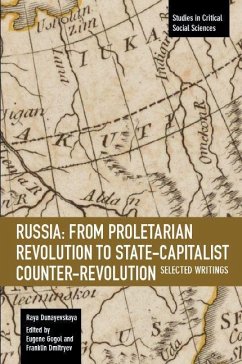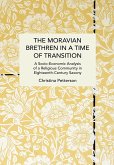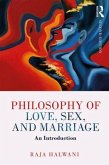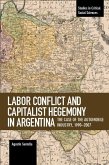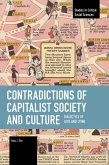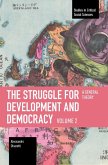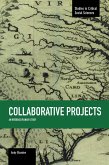Raya DunayevskayaSelected Writings
Russia: From Proletarian Revolution to State-Capitalist Counter-Revolution
Selected Writings
Herausgeber: Gogol, Eugene; Dmitryev, Franklin / Übersetzer: Dmitryev, Franklin
Raya DunayevskayaSelected Writings
Russia: From Proletarian Revolution to State-Capitalist Counter-Revolution
Selected Writings
Herausgeber: Gogol, Eugene; Dmitryev, Franklin / Übersetzer: Dmitryev, Franklin
- Broschiertes Buch
- Merkliste
- Auf die Merkliste
- Bewerten Bewerten
- Teilen
- Produkt teilen
- Produkterinnerung
- Produkterinnerung
A sweeping introduction to the thought of one of the 20th century’s most important Marxist-Humanist philosophers: Raya Dunayevskaya
Andere Kunden interessierten sich auch für
![The Moravian Brethren in a Time of Transition The Moravian Brethren in a Time of Transition]() Christina PettersonThe Moravian Brethren in a Time of Transition41,99 €
Christina PettersonThe Moravian Brethren in a Time of Transition41,99 €![Philosophy of Love, Sex, and Marriage Philosophy of Love, Sex, and Marriage]() Raja HalwaniPhilosophy of Love, Sex, and Marriage61,99 €
Raja HalwaniPhilosophy of Love, Sex, and Marriage61,99 €![Labor Conflict and Capitalist Hegemony in Argentina Labor Conflict and Capitalist Hegemony in Argentina]() Agustin SantellaLabor Conflict and Capitalist Hegemony in Argentina35,99 €
Agustin SantellaLabor Conflict and Capitalist Hegemony in Argentina35,99 €![Contradictions of Capitalist Society and Culture Contradictions of Capitalist Society and Culture]() Raju J DasContradictions of Capitalist Society and Culture29,99 €
Raju J DasContradictions of Capitalist Society and Culture29,99 €![The Struggle for Development and Democracy Volume 2 The Struggle for Development and Democracy Volume 2]() Alessandro OlsarettiThe Struggle for Development and Democracy Volume 246,99 €
Alessandro OlsarettiThe Struggle for Development and Democracy Volume 246,99 €![Messages from George Simmel Messages from George Simmel]() Horst J HelleMessages from George Simmel35,99 €
Horst J HelleMessages from George Simmel35,99 €![Collaborative Projects Collaborative Projects]() Collaborative Projects41,99 €
Collaborative Projects41,99 €-
-
-
A sweeping introduction to the thought of one of the 20th century’s most important Marxist-Humanist philosophers: Raya Dunayevskaya
Hinweis: Dieser Artikel kann nur an eine deutsche Lieferadresse ausgeliefert werden.
Hinweis: Dieser Artikel kann nur an eine deutsche Lieferadresse ausgeliefert werden.
Produktdetails
- Produktdetails
- Verlag: Haymarket Books
- Seitenzahl: 498
- Erscheinungstermin: 31. Juli 2018
- Englisch
- Abmessung: 228mm x 150mm x 28mm
- Gewicht: 678g
- ISBN-13: 9781608469338
- ISBN-10: 1608469336
- Artikelnr.: 48896138
- Herstellerkennzeichnung
- Libri GmbH
- Europaallee 1
- 36244 Bad Hersfeld
- gpsr@libri.de
- Verlag: Haymarket Books
- Seitenzahl: 498
- Erscheinungstermin: 31. Juli 2018
- Englisch
- Abmessung: 228mm x 150mm x 28mm
- Gewicht: 678g
- ISBN-13: 9781608469338
- ISBN-10: 1608469336
- Artikelnr.: 48896138
- Herstellerkennzeichnung
- Libri GmbH
- Europaallee 1
- 36244 Bad Hersfeld
- gpsr@libri.de
Raya Dunayevskaya, philosopher of Marxist-Humanism, was secretary to Leon Trotsky in exile in Mexico (1937-38). Her major writings include Marxism and Freedom (1957), Philosophy and Revolution (1973), and Rosa Luxemburg, Women’s Liberation, and Marx’s Philosophy of Revolution (1982). Eugene Gogol was one of Raya Dunayevksya's secretaries during the 1980s. He is author of an intellectual biography Raya Dunayevskaya: Philosopher of Marxist-Humanism. Among his other writings are: Toward a Dialectic of Philosophy and Organization, and Utopia and the Dialectic in Latin American Liberation. Franklin Dmitryev is co-Trustee of the Raya Dunayevskaya Memorial Fund and National Organizer of News and Letters Committees. He has published numerous articles on Dunayevskaya’s thought, Marxist-Humanist philosophy, environmental justice, climate change, and other social issues.
Editorial Note and Acknowledgements ... ix
Introduction ... 1
Eugene Gogol, Terry Moon and Franklin Dmitryev
i The Present Moment and the Russian Revolution
ii 1914–1917: War and Revolution as Testing/Turning Points
iii An American Revolutionary Born Out of the Russian Revolution
iv The Form and Content of the Present Volume
The Philosophic Moment of Marxist-Humanism
Part 1
Philosophic Preparation for Revolution: The Significance of Lenin’s Hegel
Notebooks
1 Translation of and Commentary on Lenin’s “Abstract of Hegel’s Science of
Logic” ... 21
Three Letters to C.L.R. James in the Process of Translating Lenin’s
“Abstract of Hegel’s Science of Logic”
Notes on a Series of Lectures: Lenin on Hegel’s Science of Logic
Hegelian Leninism Telos Conference
First English Language Translation of Excerpts from Lenin’s “Abstract of
Hegel’s Science of Logic”
2 Dunayevskaya’s Changed Perception of Lenin’s Philosophic Ambivalence,
1986–87 ... 109
Prologue: Lenin as Seen in Excerpts from Dunayevskaya’s May 12, 1953
Letter on Hegel’s Absolutes
Letter to Non-Marxist Hegel Scholar Louis Dupré
Excerpts from Presentations, Letters, Notes
In Lieu of Minutes of News and Letters Committees Resident
Editorial Board Meeting of August 5, 1986, on Executive Session
Presentation by Dunayevskaya to the Resident Editorial Board on December 1,
1986
“The Year of Only 8 Months,” Jan 3, 1987
Talking to Myself Document, January 21, 1987
Presentation on the Dialectics of Organization and Philosophy, June 1, 1987
Part 2
On the Meaning of Lenin’s “Great Divide in Marxism”; Contrast with Trotsky,
Bukharin, Luxemburg
3 Lenin on Self-determination of Nations and on Organization After His
Philosophic Notebooks ... 127
The Break in Lenin’s Thought
What Was New on the Party Question in the Great Divide and After: The
Relationship of the Masses to the Party
The Shock of Recognition and the Philosophic Ambivalence of Lenin
4 On Trotsky ... 142
Leon Trotsky as Man and as Theoretician
5 On Bukharin ... 160
Lenin vs. Bukharin: The Dialectic and Its Methodological Enemy, Abstract
Revolutionism
6 On Luxemburg 167
Luxemburg and Lenin: Anti-war Internationalism; Contrasting Views on
National Self-Determination—The “Junius” Pamphlet
Luxemburg’s View of the Russian Revolution
7 On Women Revolutionaries in Russia ... 174
In Memoriam: Natalia Sedova Trotsky. Role of Women in Revolution
Russia, February 1917; Germany, January 1919; and Rosa Luxemburg
Part 3
What Happens After?—Lenin 1917–1923
8 The Trade Union Debate and Lenin’s Will ... 187
The Trade Union Debate
Lenin and His New Concept: Party Work to Be Checked by Non-party Masses
Lenin’s Will
Part 4
Russia’s Transformation into Opposite: The Theory of State-Capitalism
9 The Development of State-Capitalist Theory in the 1940s ... 207
The Union of Soviet Socialist Republics is a Capitalist Society
An Analysis of Russian Economy
Labor and Society
Is Russia Part of the Collectivist Epoch of Society?
A New Revision of Marxian Economics
The Nature of the Russian Economy
Part 5
From State-Capitalist Theory to Marxist-Humanism, 1950s–1980s
Introduction: From the State-Capitalist Tendency to the Birth of a
Marxist-Humanist Organization—New Stage of Production, New Stage of
Cognition, New Kind of Organization ... 313
10 On Stalin ... 317
11 The Beginning of the End of Russian Totalitarianism ... 325
East Germany, June 17, 1953
The Revolt in the Slave Labor Camps in Vorkuta
Spontaneity of Action and Organization of Thought: In Memoriam of the
Hungarian Revolution
12 Post-Stalin Russia ... 333
Without a Past and Without a Future [On Khrushchev]
After the 20th Congress of the Russian Communist Party: Where is Russia
Going?
Tito’s Turnabout
Andropov’s Ascendancy Reflects Final State of State-Capitalism’s Degeneracy
Reagan, Gorbachev in Iceland: All Things Fall Apart
13 On Mao’s China ... 354
Only Freedom Can Solve the Crisis
“Let 100 Flowers Bloom…But Only One Party Rule”
The “Philosophy” of the Yenan Period: Mao Perverts Lenin
Sino-Indian War Reveals Relationship of Ideology to State-Capitalist
Imperialism
Indonesian Communism: A Case of World Communism’s Decomposition
14 The Sino-Soviet Split ... 378
Can There Be War between Russia and China? The Non-Viability of
State-Capitalism
Splintered World Communism
15 The Cuban Revolution and What Happens After? ... 398
The Cuban Revolution: The Year After
Ideology and Revolution: A Study of What Happens After…
The Double Tragedy of Che Guevara
Shortcut to Revolution or Long Road to Tragedy? On Regis Debray’s
Revolution in the Revolution
16 State-Capitalism as a “New Stage of World Capitalism” vs. The Humanism
of Marx ... 416
The Humanism of Marx is the Basic Foundation for Anti-Stalinism Today
The New Stage of World Capitalism: State-Capitalism
“Culture,” Science and State-Capitalism
State-Capitalism and the Dialectic
17 Battle of Ideas ... 438
Milovan Djilas’ New Class
Intellectuals in the Age of State-Capitalism [On Herbert Marcuse’s Soviet
Marxism]
Western Intellectuals Help K[hrushchev], Inc. Rebury Lenin’s
Philosophic Legacy [On Gustav A. Wetter, David Joravsky, George Lichtheim,
Eugene Kamenka]
Footnote on the Detractors of Lenin [On Cornelius Castoriadis (aka Pierre
Chaulieu or Paul Cardan)]
Lukács’ Philosophic Dimension
Tony Cliff Degrades Lenin as Theoretician
Bibliography ... 471
Index ... 480
Introduction ... 1
Eugene Gogol, Terry Moon and Franklin Dmitryev
i The Present Moment and the Russian Revolution
ii 1914–1917: War and Revolution as Testing/Turning Points
iii An American Revolutionary Born Out of the Russian Revolution
iv The Form and Content of the Present Volume
The Philosophic Moment of Marxist-Humanism
Part 1
Philosophic Preparation for Revolution: The Significance of Lenin’s Hegel
Notebooks
1 Translation of and Commentary on Lenin’s “Abstract of Hegel’s Science of
Logic” ... 21
Three Letters to C.L.R. James in the Process of Translating Lenin’s
“Abstract of Hegel’s Science of Logic”
Notes on a Series of Lectures: Lenin on Hegel’s Science of Logic
Hegelian Leninism Telos Conference
First English Language Translation of Excerpts from Lenin’s “Abstract of
Hegel’s Science of Logic”
2 Dunayevskaya’s Changed Perception of Lenin’s Philosophic Ambivalence,
1986–87 ... 109
Prologue: Lenin as Seen in Excerpts from Dunayevskaya’s May 12, 1953
Letter on Hegel’s Absolutes
Letter to Non-Marxist Hegel Scholar Louis Dupré
Excerpts from Presentations, Letters, Notes
In Lieu of Minutes of News and Letters Committees Resident
Editorial Board Meeting of August 5, 1986, on Executive Session
Presentation by Dunayevskaya to the Resident Editorial Board on December 1,
1986
“The Year of Only 8 Months,” Jan 3, 1987
Talking to Myself Document, January 21, 1987
Presentation on the Dialectics of Organization and Philosophy, June 1, 1987
Part 2
On the Meaning of Lenin’s “Great Divide in Marxism”; Contrast with Trotsky,
Bukharin, Luxemburg
3 Lenin on Self-determination of Nations and on Organization After His
Philosophic Notebooks ... 127
The Break in Lenin’s Thought
What Was New on the Party Question in the Great Divide and After: The
Relationship of the Masses to the Party
The Shock of Recognition and the Philosophic Ambivalence of Lenin
4 On Trotsky ... 142
Leon Trotsky as Man and as Theoretician
5 On Bukharin ... 160
Lenin vs. Bukharin: The Dialectic and Its Methodological Enemy, Abstract
Revolutionism
6 On Luxemburg 167
Luxemburg and Lenin: Anti-war Internationalism; Contrasting Views on
National Self-Determination—The “Junius” Pamphlet
Luxemburg’s View of the Russian Revolution
7 On Women Revolutionaries in Russia ... 174
In Memoriam: Natalia Sedova Trotsky. Role of Women in Revolution
Russia, February 1917; Germany, January 1919; and Rosa Luxemburg
Part 3
What Happens After?—Lenin 1917–1923
8 The Trade Union Debate and Lenin’s Will ... 187
The Trade Union Debate
Lenin and His New Concept: Party Work to Be Checked by Non-party Masses
Lenin’s Will
Part 4
Russia’s Transformation into Opposite: The Theory of State-Capitalism
9 The Development of State-Capitalist Theory in the 1940s ... 207
The Union of Soviet Socialist Republics is a Capitalist Society
An Analysis of Russian Economy
Labor and Society
Is Russia Part of the Collectivist Epoch of Society?
A New Revision of Marxian Economics
The Nature of the Russian Economy
Part 5
From State-Capitalist Theory to Marxist-Humanism, 1950s–1980s
Introduction: From the State-Capitalist Tendency to the Birth of a
Marxist-Humanist Organization—New Stage of Production, New Stage of
Cognition, New Kind of Organization ... 313
10 On Stalin ... 317
11 The Beginning of the End of Russian Totalitarianism ... 325
East Germany, June 17, 1953
The Revolt in the Slave Labor Camps in Vorkuta
Spontaneity of Action and Organization of Thought: In Memoriam of the
Hungarian Revolution
12 Post-Stalin Russia ... 333
Without a Past and Without a Future [On Khrushchev]
After the 20th Congress of the Russian Communist Party: Where is Russia
Going?
Tito’s Turnabout
Andropov’s Ascendancy Reflects Final State of State-Capitalism’s Degeneracy
Reagan, Gorbachev in Iceland: All Things Fall Apart
13 On Mao’s China ... 354
Only Freedom Can Solve the Crisis
“Let 100 Flowers Bloom…But Only One Party Rule”
The “Philosophy” of the Yenan Period: Mao Perverts Lenin
Sino-Indian War Reveals Relationship of Ideology to State-Capitalist
Imperialism
Indonesian Communism: A Case of World Communism’s Decomposition
14 The Sino-Soviet Split ... 378
Can There Be War between Russia and China? The Non-Viability of
State-Capitalism
Splintered World Communism
15 The Cuban Revolution and What Happens After? ... 398
The Cuban Revolution: The Year After
Ideology and Revolution: A Study of What Happens After…
The Double Tragedy of Che Guevara
Shortcut to Revolution or Long Road to Tragedy? On Regis Debray’s
Revolution in the Revolution
16 State-Capitalism as a “New Stage of World Capitalism” vs. The Humanism
of Marx ... 416
The Humanism of Marx is the Basic Foundation for Anti-Stalinism Today
The New Stage of World Capitalism: State-Capitalism
“Culture,” Science and State-Capitalism
State-Capitalism and the Dialectic
17 Battle of Ideas ... 438
Milovan Djilas’ New Class
Intellectuals in the Age of State-Capitalism [On Herbert Marcuse’s Soviet
Marxism]
Western Intellectuals Help K[hrushchev], Inc. Rebury Lenin’s
Philosophic Legacy [On Gustav A. Wetter, David Joravsky, George Lichtheim,
Eugene Kamenka]
Footnote on the Detractors of Lenin [On Cornelius Castoriadis (aka Pierre
Chaulieu or Paul Cardan)]
Lukács’ Philosophic Dimension
Tony Cliff Degrades Lenin as Theoretician
Bibliography ... 471
Index ... 480
Editorial Note and Acknowledgements ... ix
Introduction ... 1
Eugene Gogol, Terry Moon and Franklin Dmitryev
i The Present Moment and the Russian Revolution
ii 1914–1917: War and Revolution as Testing/Turning Points
iii An American Revolutionary Born Out of the Russian Revolution
iv The Form and Content of the Present Volume
The Philosophic Moment of Marxist-Humanism
Part 1
Philosophic Preparation for Revolution: The Significance of Lenin’s Hegel
Notebooks
1 Translation of and Commentary on Lenin’s “Abstract of Hegel’s Science of
Logic” ... 21
Three Letters to C.L.R. James in the Process of Translating Lenin’s
“Abstract of Hegel’s Science of Logic”
Notes on a Series of Lectures: Lenin on Hegel’s Science of Logic
Hegelian Leninism Telos Conference
First English Language Translation of Excerpts from Lenin’s “Abstract of
Hegel’s Science of Logic”
2 Dunayevskaya’s Changed Perception of Lenin’s Philosophic Ambivalence,
1986–87 ... 109
Prologue: Lenin as Seen in Excerpts from Dunayevskaya’s May 12, 1953
Letter on Hegel’s Absolutes
Letter to Non-Marxist Hegel Scholar Louis Dupré
Excerpts from Presentations, Letters, Notes
In Lieu of Minutes of News and Letters Committees Resident
Editorial Board Meeting of August 5, 1986, on Executive Session
Presentation by Dunayevskaya to the Resident Editorial Board on December 1,
1986
“The Year of Only 8 Months,” Jan 3, 1987
Talking to Myself Document, January 21, 1987
Presentation on the Dialectics of Organization and Philosophy, June 1, 1987
Part 2
On the Meaning of Lenin’s “Great Divide in Marxism”; Contrast with Trotsky,
Bukharin, Luxemburg
3 Lenin on Self-determination of Nations and on Organization After His
Philosophic Notebooks ... 127
The Break in Lenin’s Thought
What Was New on the Party Question in the Great Divide and After: The
Relationship of the Masses to the Party
The Shock of Recognition and the Philosophic Ambivalence of Lenin
4 On Trotsky ... 142
Leon Trotsky as Man and as Theoretician
5 On Bukharin ... 160
Lenin vs. Bukharin: The Dialectic and Its Methodological Enemy, Abstract
Revolutionism
6 On Luxemburg 167
Luxemburg and Lenin: Anti-war Internationalism; Contrasting Views on
National Self-Determination—The “Junius” Pamphlet
Luxemburg’s View of the Russian Revolution
7 On Women Revolutionaries in Russia ... 174
In Memoriam: Natalia Sedova Trotsky. Role of Women in Revolution
Russia, February 1917; Germany, January 1919; and Rosa Luxemburg
Part 3
What Happens After?—Lenin 1917–1923
8 The Trade Union Debate and Lenin’s Will ... 187
The Trade Union Debate
Lenin and His New Concept: Party Work to Be Checked by Non-party Masses
Lenin’s Will
Part 4
Russia’s Transformation into Opposite: The Theory of State-Capitalism
9 The Development of State-Capitalist Theory in the 1940s ... 207
The Union of Soviet Socialist Republics is a Capitalist Society
An Analysis of Russian Economy
Labor and Society
Is Russia Part of the Collectivist Epoch of Society?
A New Revision of Marxian Economics
The Nature of the Russian Economy
Part 5
From State-Capitalist Theory to Marxist-Humanism, 1950s–1980s
Introduction: From the State-Capitalist Tendency to the Birth of a
Marxist-Humanist Organization—New Stage of Production, New Stage of
Cognition, New Kind of Organization ... 313
10 On Stalin ... 317
11 The Beginning of the End of Russian Totalitarianism ... 325
East Germany, June 17, 1953
The Revolt in the Slave Labor Camps in Vorkuta
Spontaneity of Action and Organization of Thought: In Memoriam of the
Hungarian Revolution
12 Post-Stalin Russia ... 333
Without a Past and Without a Future [On Khrushchev]
After the 20th Congress of the Russian Communist Party: Where is Russia
Going?
Tito’s Turnabout
Andropov’s Ascendancy Reflects Final State of State-Capitalism’s Degeneracy
Reagan, Gorbachev in Iceland: All Things Fall Apart
13 On Mao’s China ... 354
Only Freedom Can Solve the Crisis
“Let 100 Flowers Bloom…But Only One Party Rule”
The “Philosophy” of the Yenan Period: Mao Perverts Lenin
Sino-Indian War Reveals Relationship of Ideology to State-Capitalist
Imperialism
Indonesian Communism: A Case of World Communism’s Decomposition
14 The Sino-Soviet Split ... 378
Can There Be War between Russia and China? The Non-Viability of
State-Capitalism
Splintered World Communism
15 The Cuban Revolution and What Happens After? ... 398
The Cuban Revolution: The Year After
Ideology and Revolution: A Study of What Happens After…
The Double Tragedy of Che Guevara
Shortcut to Revolution or Long Road to Tragedy? On Regis Debray’s
Revolution in the Revolution
16 State-Capitalism as a “New Stage of World Capitalism” vs. The Humanism
of Marx ... 416
The Humanism of Marx is the Basic Foundation for Anti-Stalinism Today
The New Stage of World Capitalism: State-Capitalism
“Culture,” Science and State-Capitalism
State-Capitalism and the Dialectic
17 Battle of Ideas ... 438
Milovan Djilas’ New Class
Intellectuals in the Age of State-Capitalism [On Herbert Marcuse’s Soviet
Marxism]
Western Intellectuals Help K[hrushchev], Inc. Rebury Lenin’s
Philosophic Legacy [On Gustav A. Wetter, David Joravsky, George Lichtheim,
Eugene Kamenka]
Footnote on the Detractors of Lenin [On Cornelius Castoriadis (aka Pierre
Chaulieu or Paul Cardan)]
Lukács’ Philosophic Dimension
Tony Cliff Degrades Lenin as Theoretician
Bibliography ... 471
Index ... 480
Introduction ... 1
Eugene Gogol, Terry Moon and Franklin Dmitryev
i The Present Moment and the Russian Revolution
ii 1914–1917: War and Revolution as Testing/Turning Points
iii An American Revolutionary Born Out of the Russian Revolution
iv The Form and Content of the Present Volume
The Philosophic Moment of Marxist-Humanism
Part 1
Philosophic Preparation for Revolution: The Significance of Lenin’s Hegel
Notebooks
1 Translation of and Commentary on Lenin’s “Abstract of Hegel’s Science of
Logic” ... 21
Three Letters to C.L.R. James in the Process of Translating Lenin’s
“Abstract of Hegel’s Science of Logic”
Notes on a Series of Lectures: Lenin on Hegel’s Science of Logic
Hegelian Leninism Telos Conference
First English Language Translation of Excerpts from Lenin’s “Abstract of
Hegel’s Science of Logic”
2 Dunayevskaya’s Changed Perception of Lenin’s Philosophic Ambivalence,
1986–87 ... 109
Prologue: Lenin as Seen in Excerpts from Dunayevskaya’s May 12, 1953
Letter on Hegel’s Absolutes
Letter to Non-Marxist Hegel Scholar Louis Dupré
Excerpts from Presentations, Letters, Notes
In Lieu of Minutes of News and Letters Committees Resident
Editorial Board Meeting of August 5, 1986, on Executive Session
Presentation by Dunayevskaya to the Resident Editorial Board on December 1,
1986
“The Year of Only 8 Months,” Jan 3, 1987
Talking to Myself Document, January 21, 1987
Presentation on the Dialectics of Organization and Philosophy, June 1, 1987
Part 2
On the Meaning of Lenin’s “Great Divide in Marxism”; Contrast with Trotsky,
Bukharin, Luxemburg
3 Lenin on Self-determination of Nations and on Organization After His
Philosophic Notebooks ... 127
The Break in Lenin’s Thought
What Was New on the Party Question in the Great Divide and After: The
Relationship of the Masses to the Party
The Shock of Recognition and the Philosophic Ambivalence of Lenin
4 On Trotsky ... 142
Leon Trotsky as Man and as Theoretician
5 On Bukharin ... 160
Lenin vs. Bukharin: The Dialectic and Its Methodological Enemy, Abstract
Revolutionism
6 On Luxemburg 167
Luxemburg and Lenin: Anti-war Internationalism; Contrasting Views on
National Self-Determination—The “Junius” Pamphlet
Luxemburg’s View of the Russian Revolution
7 On Women Revolutionaries in Russia ... 174
In Memoriam: Natalia Sedova Trotsky. Role of Women in Revolution
Russia, February 1917; Germany, January 1919; and Rosa Luxemburg
Part 3
What Happens After?—Lenin 1917–1923
8 The Trade Union Debate and Lenin’s Will ... 187
The Trade Union Debate
Lenin and His New Concept: Party Work to Be Checked by Non-party Masses
Lenin’s Will
Part 4
Russia’s Transformation into Opposite: The Theory of State-Capitalism
9 The Development of State-Capitalist Theory in the 1940s ... 207
The Union of Soviet Socialist Republics is a Capitalist Society
An Analysis of Russian Economy
Labor and Society
Is Russia Part of the Collectivist Epoch of Society?
A New Revision of Marxian Economics
The Nature of the Russian Economy
Part 5
From State-Capitalist Theory to Marxist-Humanism, 1950s–1980s
Introduction: From the State-Capitalist Tendency to the Birth of a
Marxist-Humanist Organization—New Stage of Production, New Stage of
Cognition, New Kind of Organization ... 313
10 On Stalin ... 317
11 The Beginning of the End of Russian Totalitarianism ... 325
East Germany, June 17, 1953
The Revolt in the Slave Labor Camps in Vorkuta
Spontaneity of Action and Organization of Thought: In Memoriam of the
Hungarian Revolution
12 Post-Stalin Russia ... 333
Without a Past and Without a Future [On Khrushchev]
After the 20th Congress of the Russian Communist Party: Where is Russia
Going?
Tito’s Turnabout
Andropov’s Ascendancy Reflects Final State of State-Capitalism’s Degeneracy
Reagan, Gorbachev in Iceland: All Things Fall Apart
13 On Mao’s China ... 354
Only Freedom Can Solve the Crisis
“Let 100 Flowers Bloom…But Only One Party Rule”
The “Philosophy” of the Yenan Period: Mao Perverts Lenin
Sino-Indian War Reveals Relationship of Ideology to State-Capitalist
Imperialism
Indonesian Communism: A Case of World Communism’s Decomposition
14 The Sino-Soviet Split ... 378
Can There Be War between Russia and China? The Non-Viability of
State-Capitalism
Splintered World Communism
15 The Cuban Revolution and What Happens After? ... 398
The Cuban Revolution: The Year After
Ideology and Revolution: A Study of What Happens After…
The Double Tragedy of Che Guevara
Shortcut to Revolution or Long Road to Tragedy? On Regis Debray’s
Revolution in the Revolution
16 State-Capitalism as a “New Stage of World Capitalism” vs. The Humanism
of Marx ... 416
The Humanism of Marx is the Basic Foundation for Anti-Stalinism Today
The New Stage of World Capitalism: State-Capitalism
“Culture,” Science and State-Capitalism
State-Capitalism and the Dialectic
17 Battle of Ideas ... 438
Milovan Djilas’ New Class
Intellectuals in the Age of State-Capitalism [On Herbert Marcuse’s Soviet
Marxism]
Western Intellectuals Help K[hrushchev], Inc. Rebury Lenin’s
Philosophic Legacy [On Gustav A. Wetter, David Joravsky, George Lichtheim,
Eugene Kamenka]
Footnote on the Detractors of Lenin [On Cornelius Castoriadis (aka Pierre
Chaulieu or Paul Cardan)]
Lukács’ Philosophic Dimension
Tony Cliff Degrades Lenin as Theoretician
Bibliography ... 471
Index ... 480

